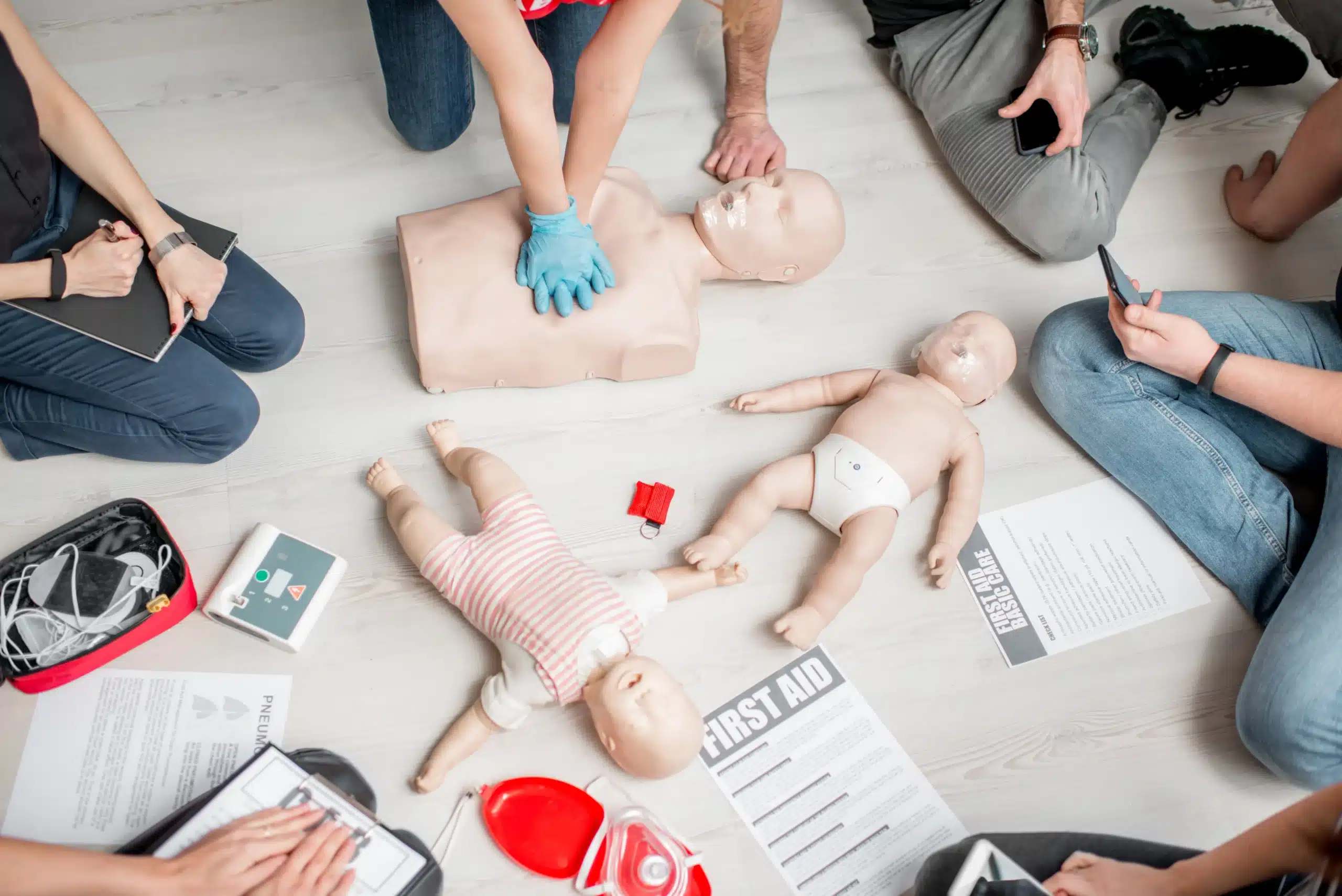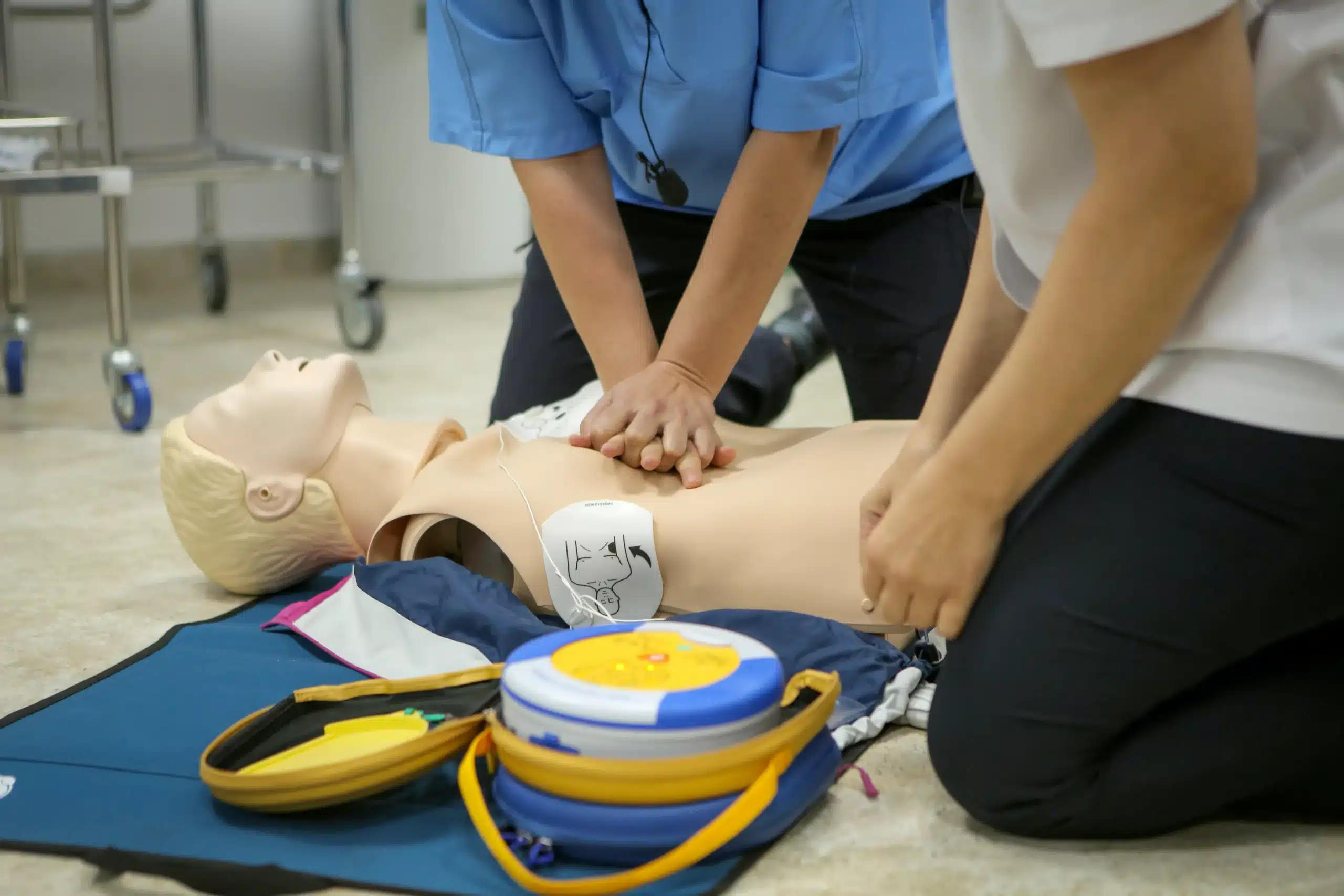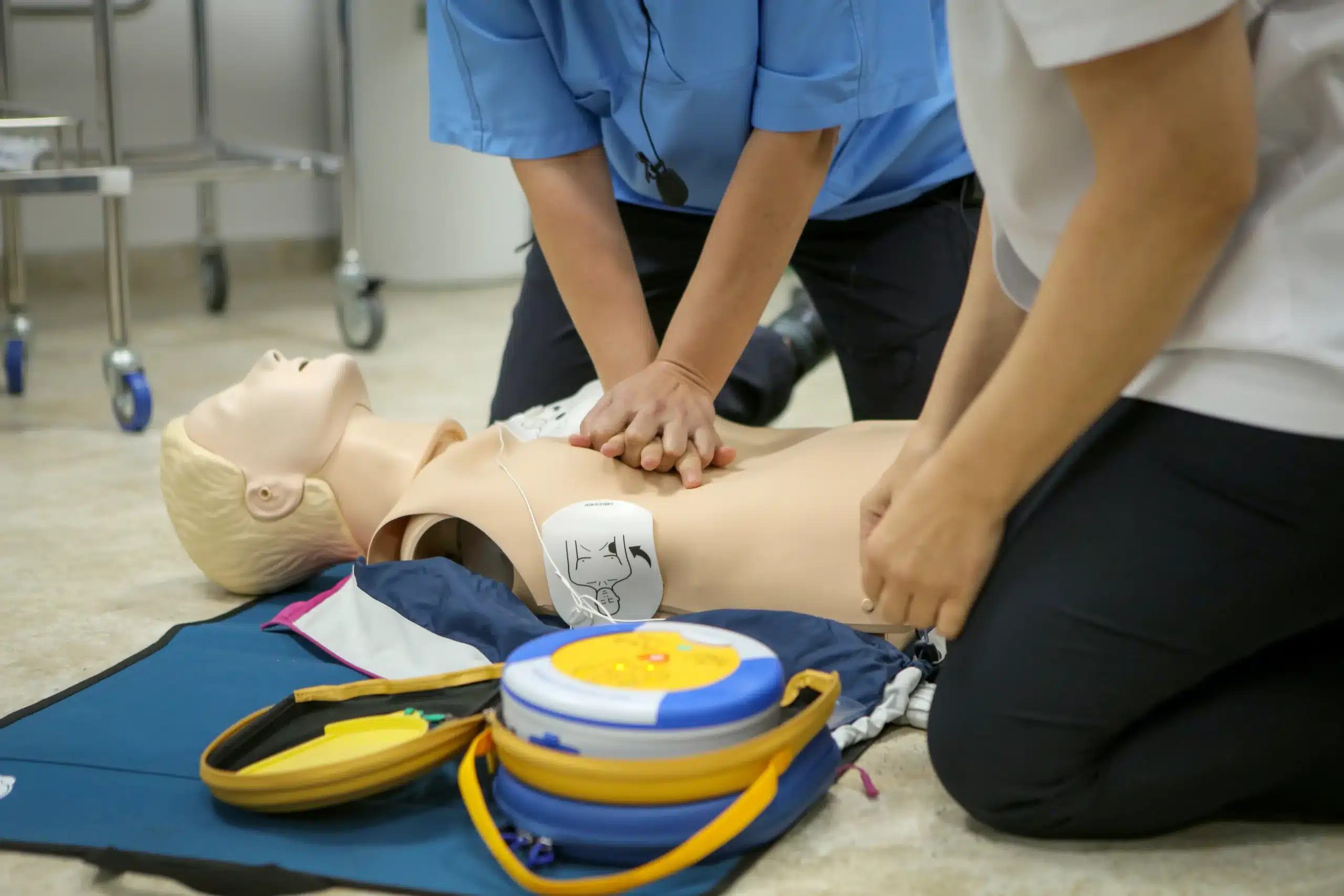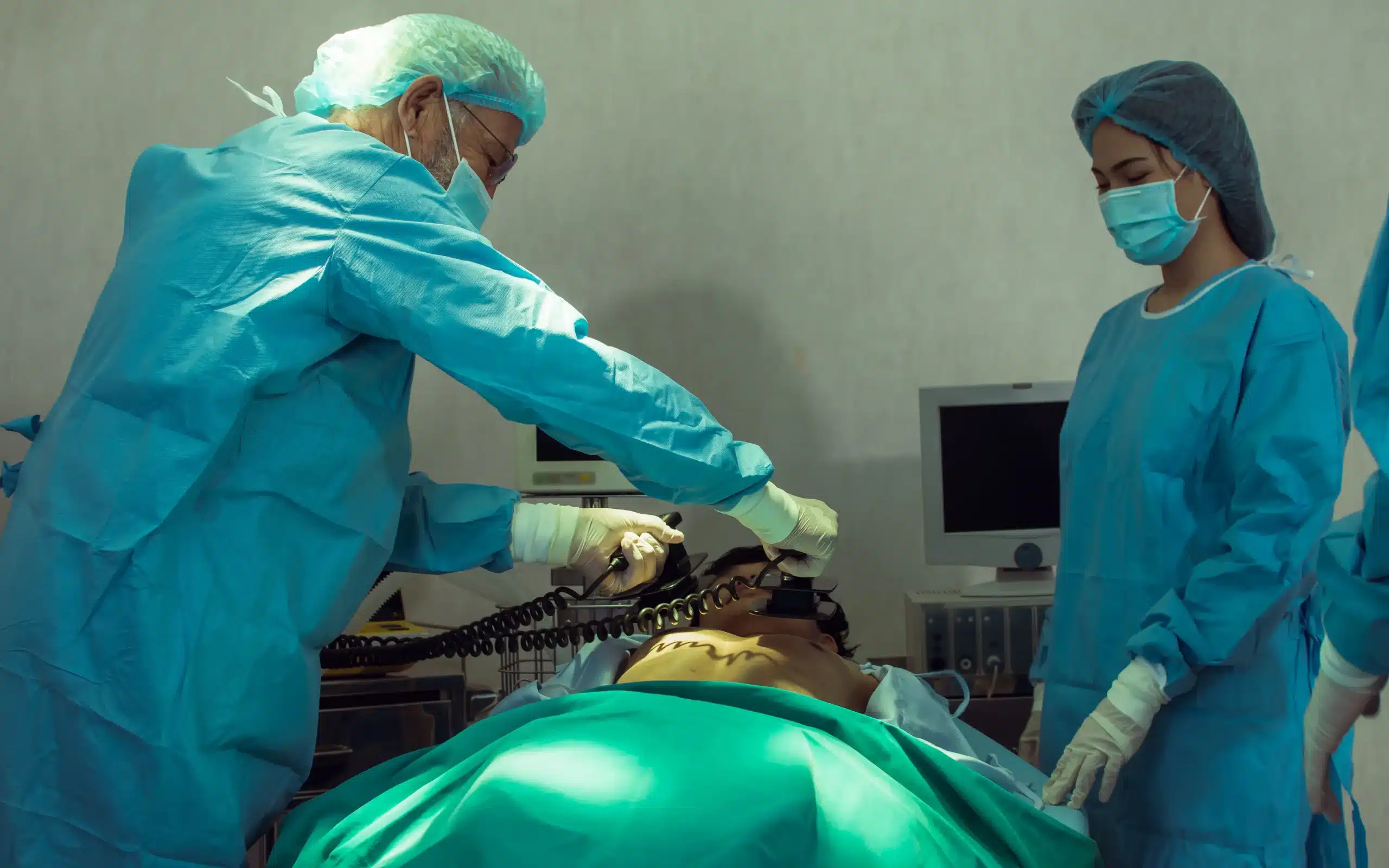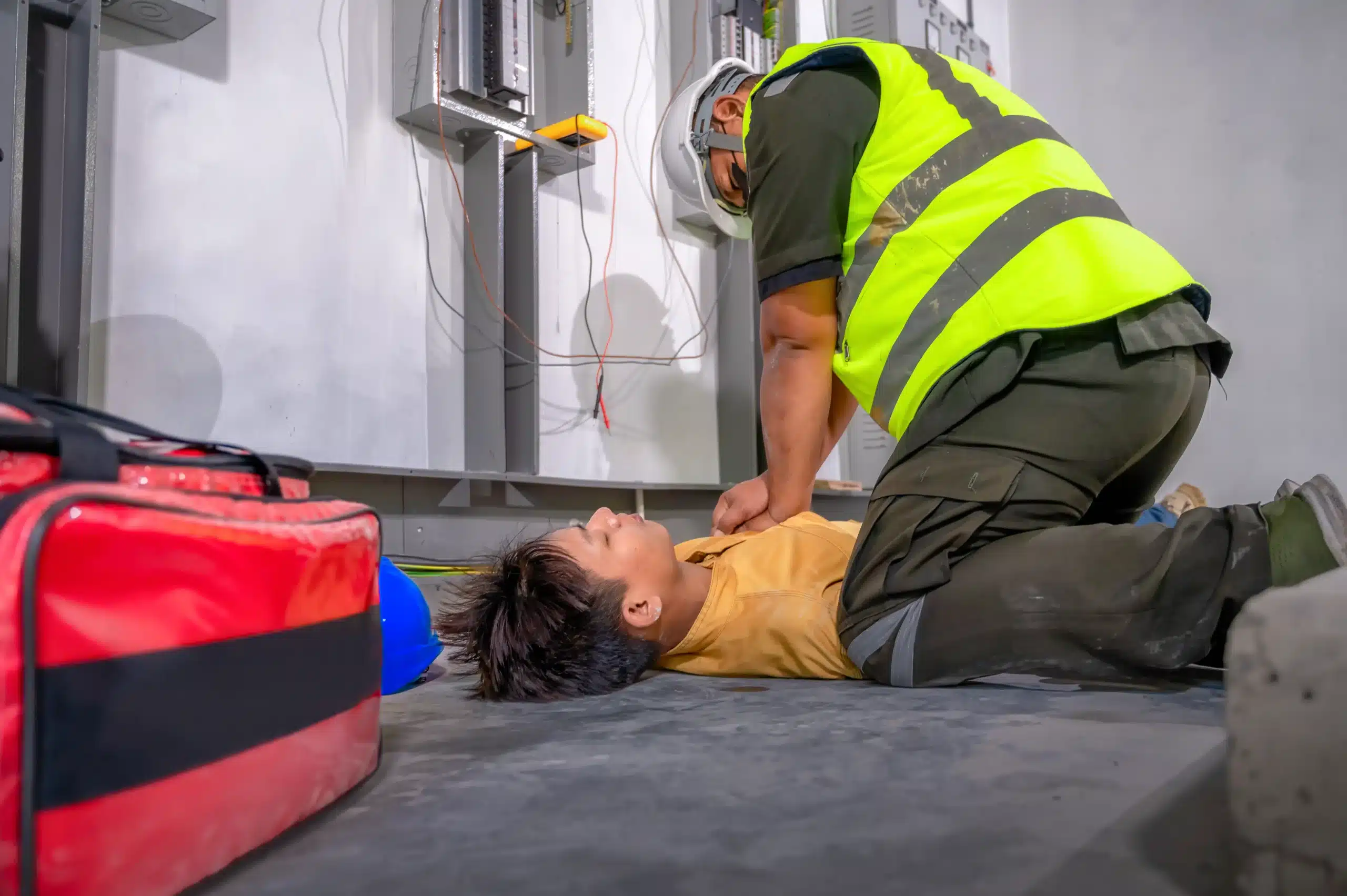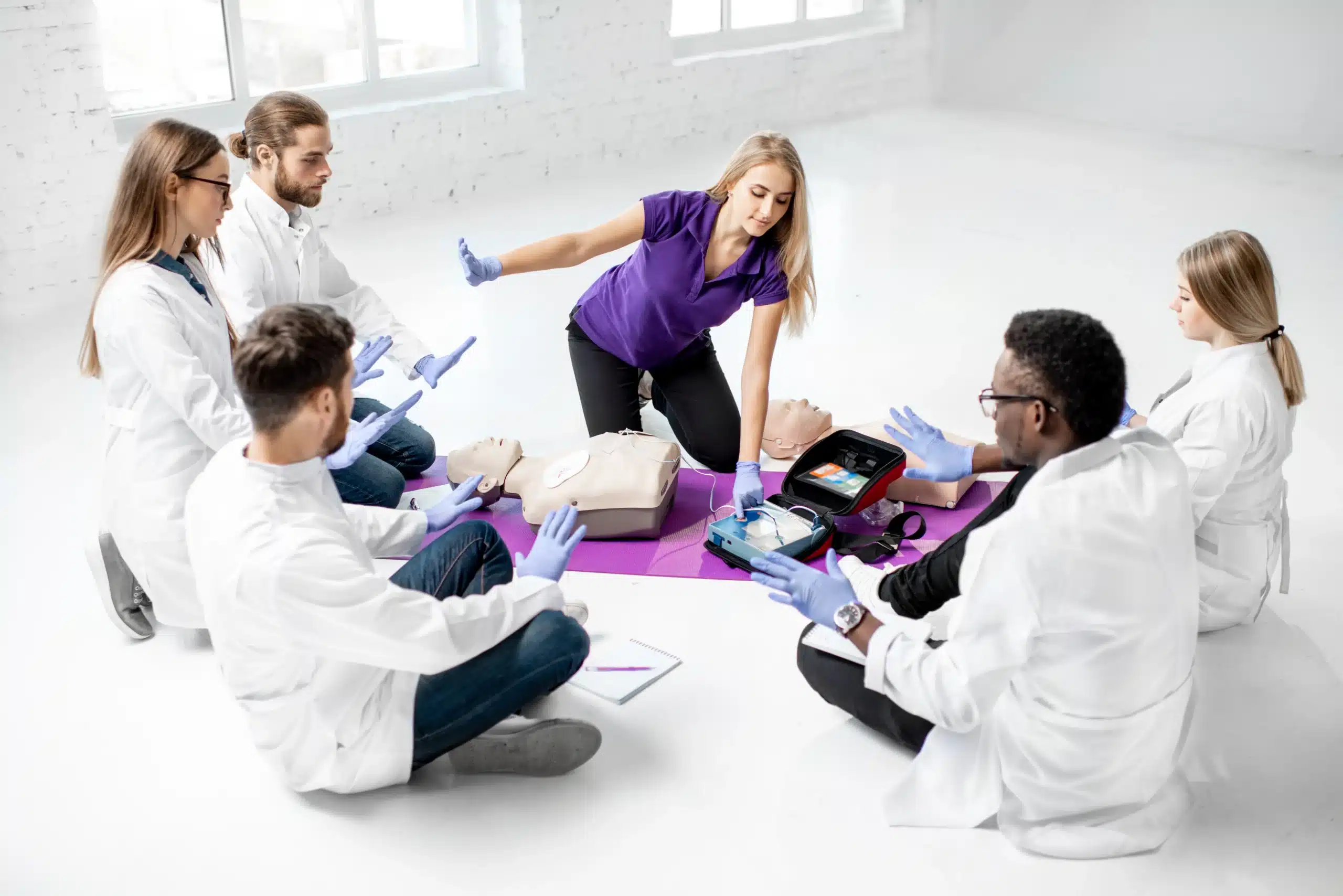Life is unpredictable, and knowing how to respond in a medical emergency can be the difference between a positive outcome and a tragedy. First aid classes in Santa Cruz provide the training you need to act quickly and effectively when every second counts. This article explores the range of first aid training options available in Santa Cruz, from basic CPR to specialized certifications like ACLS and PALS. We’ll discuss the importance of these skills, the various course formats, and how to find the right class to fit your lifestyle and goals.
Key Takeaways
- Choose the right first aid class: Whether you need basic first aid or advanced certification, Santa Cruz offers various courses tailored to different needs. Consider your personal and professional goals when selecting a class.
- Find reputable training in Santa Cruz: Organizations like Safety Training Seminars, an official American Heart Association Training Center, and the American Red Cross provide high-quality instruction. Explore options, compare offerings, and check for free or low-cost alternatives.
- Maintain your skills and certifications: First aid and CPR skills require regular updating. Renew your certifications and pursue continuing education to stay prepared and confident in responding to emergencies.
What are First Aid Classes in Santa Cruz?
First aid classes in Santa Cruz give you the skills to handle medical emergencies. These courses cover essential techniques, from treating minor injuries like cuts and burns to managing serious situations like choking or cardiac arrest. You’ll learn how to administer CPR and use an AED. First aid training in Santa Cruz offers comprehensive instruction, including Basic Life Support (BLS), Advanced Cardiovascular Life Support (ACLS), and Pediatric Advanced Life Support (PALS), preparing you for various emergencies. As an official American Heart Association Training Center, Safety Training Seminars provides these certifications, building your confidence to respond effectively under pressure. Whether you’re a healthcare provider, a concerned citizen, or simply want to be prepared, these classes are designed for all backgrounds. They empower you to deliver immediate care while waiting for professional medical help, potentially making a life-saving difference.
First Aid Class Types
Knowing which first aid class is right for you can feel overwhelming with so many options. This section breaks down the different types of first aid classes available in Santa Cruz, so you can choose the best fit.
CPR Certification
CPR certification classes teach you the lifesaving skills needed to respond to cardiac emergencies. You’ll learn how to recognize the signs of a heart attack, perform chest compressions, and provide rescue breaths. These skills can make a critical difference while waiting for first responders. The American Red Cross offers CPR/AED classes in Santa Cruz, equipping participants with the knowledge and confidence to act in emergencies. CPR certification is valuable for everyone, from concerned citizens to healthcare professionals.
Basic Life Support (BLS)
Basic Life Support (BLS) training goes a step further than general CPR. It’s crucial for healthcare providers, first responders, and anyone working in a medical setting. BLS certification courses cover essential skills for responding to cardiac and respiratory arrest, including using an AED, bag-mask ventilation, and team dynamics during resuscitation. Safety Training Seminars provides comprehensive BLS training in Santa Cruz, ensuring participants receive high-quality instruction and certification.
Advanced Cardiovascular Life Support (ACLS)
Advanced Cardiovascular Life Support (ACLS) focuses on the advanced management of cardiac arrest and other cardiovascular emergencies. This course is designed for healthcare professionals frequently involved in managing these critical situations. ACLS certification covers topics like airway management, pharmacology, and electrocardiogram (ECG) interpretation. Safety Training Seminars offers both new and renewal ACLS certification courses in Santa Cruz.
Pediatric Advanced Life Support (PALS)
Pediatric Advanced Life Support (PALS) training equips healthcare providers with the skills to respond to emergencies in infants and children. This specialized training focuses on the unique physiological differences between children and adults, ensuring participants can provide appropriate care in pediatric emergencies. PALS certification covers topics like pediatric assessment, respiratory management, and defibrillation protocols. Safety Training Seminars includes PALS certification in their training offerings.
General First Aid Training
General first aid training provides essential skills for handling a wide range of non-life-threatening medical situations. You’ll learn how to treat minor injuries like cuts, burns, and sprains, and how to manage more serious situations like allergic reactions and choking. Taking CPR and first aid certification classes in Santa Cruz gives you valuable skills for personal and professional use.
Top Santa Cruz First Aid Class Providers
Finding the right first aid class can feel overwhelming with so many options. To simplify your search, I’ve compiled a list of reputable providers in Santa Cruz. Whether you’re looking for basic first aid knowledge or advanced certifications like ACLS, this list is a great place to start.
Safety Training Seminars
Safety Training Seminars, an official American Heart Association (AHA) Training Center, offers various certification courses, including CPR, BLS, ACLS, and PALS. They prioritize high-quality training and convenient scheduling. Learn more about their BLS certification.
American Red Cross
The American Red Cross is a well-known provider of CPR/AED and first aid training. Their Santa Cruz chapter offers courses designed to equip people with essential lifesaving skills.
Central Fire District
The Central Fire District (CFD) provides free monthly CPR classes to the community, typically held on the fourth Monday of each month at their Administration Office.
Defib This
Defib This focuses on equipping people with the skills to respond effectively in emergencies. They offer first aid and CPR training in Santa Cruz. Find more information about Defib This and other local providers on review sites like Yelp.
Above Bar CPR
Above Bar CPR emphasizes hands-on training and certification for their CPR and first aid courses. Compare reviews and offerings on Yelp.
Medics For Life
Medics For Life offers comprehensive first aid and CPR training for individuals and groups. They’re also listed on Yelp along with other Santa Cruz providers.
Blackwolf Medical Services
Blackwolf Medical Services provides first aid and CPR training focused on practical skills and emergency preparedness. Check out their offerings and compare them to others on sites like Yelp.
First Aid Class Costs & Value
Knowing the price range for first aid classes helps you budget and find the best value. Let’s break down the typical costs and explore some smart ways to save.
Average Price Range
In Santa Cruz, a standard two-hour CPR and AED course typically costs around $35 per person. If you’re an employer training a group, you can often find a discounted rate. For example, a class for eight or more employees might cost around $280 total, according to resources like Thumbtack.
Free & Low-Cost Options
Looking for budget-friendly options? The Central Fire District in Santa Cruz County offers free monthly CPR classes. These two-hour sessions are a fantastic resource for learning these essential skills without breaking the bank. Check their website for their schedule.
Discounts & Special Offers
While discounts on the classes themselves can be hard to come by, it’s worth checking the Red Cross website for deals on training materials like books and DVDs. They sometimes offer promotions on emergency preparedness items, helpful for building your personal first aid kit.
Safety Training Seminars’ Low Price Guarantee
At Safety Training Seminars, we believe in providing high-quality training at accessible prices. We offer a low price guarantee on our CPR BLS Renewal courses, ensuring you get the best possible value. Contact us to learn more about our commitment to affordable training.
Registering & Scheduling Your Class
Ready to sign up for a first aid class? Great! Here’s a rundown of how to register and what to expect regarding scheduling.
Online Registration
For many, registering online is the quickest and easiest way to secure a spot in a first aid class. Safety Training Seminars provides online registration for all certifications, including CPR, BLS, ACLS, PALS, and First Aid. This streamlined process lets you choose the class that fits your needs and complete your registration from the comfort of your home.
In-Person Sign-Up
If you prefer a more personal approach, or have questions before signing up, you can register by calling Safety Training Seminars directly at 831-479-6842 or by contacting them through their website.
Class Schedules & Flexibility
Finding a class that fits your busy schedule is a top priority. Safety Training Seminars offers classes at various times and locations throughout Santa Cruz, Monterey, and Capitola to accommodate different schedules. This flexibility makes it easier to find a class that works for you.
Limited Class Sizes
Class sizes are often limited to ensure each student receives personalized attention and high-quality instruction. Because of this, it’s always a good idea to register in advance to guarantee your spot, especially if you have a specific class time in mind. Don’t wait until the last minute—sign up early!
What Happens in a First Aid Class?
Knowing what to expect can help you feel prepared and confident going into your first aid training. Here’s a look at the typical process.
Course Duration & Format
First aid classes in Santa Cruz are offered in various formats to fit your schedule and learning style. You can choose from in-person training, online courses, or a blended learning experience that combines both. In-person classes at Safety Training Seminars prioritize hands-on learning and direct interaction with our expert instructors. Online courses offer flexibility, allowing you to learn at your own pace from anywhere with an internet connection. Blended learning combines the best of both worlds, offering online instruction followed by an in-person skills session. Class length varies depending on the format and content, ranging from about two to four hours.
Hands-On Training
Hands-on training is a critical component of most first aid and CPR certifications, especially those meeting OSHA requirements. In these sessions, you’ll practice essential skills like CPR, bandaging, and splinting under the guidance of a certified instructor. This practical experience builds your confidence and prepares you to respond effectively in real-life emergencies. While online-only courses offer convenience, they typically don’t provide the hands-on training necessary for OSHA-compliant certification.
Certification Process & Validity
Upon successful completion of an in-person or blended learning first aid course, you’ll receive a certification valid for two years. This certification demonstrates your competency in providing basic first aid and often meets OSHA standards for workplace safety. Make sure to check the specific requirements for your profession or workplace.
Instructor Qualifications
At Safety Training Seminars, our instructors are certified by the American Heart Association (AHA), ensuring you receive high-quality training based on the latest guidelines. As an AHA Training Center, we maintain rigorous standards for our instructors and curriculum. You can rest assured that the skills and knowledge you gain will equip you to handle emergencies effectively.
Choose the Right First Aid Class
Finding the right first aid class depends on several factors. Take some time to think about why you’re taking the class, what kinds of emergencies you anticipate encountering, and what kind of certification you might need.
Assess Your Needs
Before you sign up for a class, consider your specific needs. Are you a parent wanting to be prepared for childhood emergencies? A teacher responsible for a classroom of students? A coach working with athletes? Or perhaps a healthcare professional needing to maintain licensure? Understanding the types of emergencies you’re most likely to face will help you choose the most relevant course. For example, a wilderness first aid course might be more appropriate for an avid hiker than a basic first aid class. If you live in the Santa Cruz area, CPR and first aid certification courses are readily available to equip you for various emergency situations.
Compare Course Offerings
Different organizations offer a variety of first aid and CPR classes tailored to specific audiences. Look at what each organization provides and compare their course content. Safety Training Seminars in Santa Cruz offers American Heart Association-accredited courses in CPR, BLS, ACLS, PALS, and first aid, covering a broad spectrum of needs. The American Red Cross also offers a selection of first aid and CPR training programs. Reviewing different course offerings will help you find the best fit.
Consider Certification Requirements
If you need certification for your job or to meet specific requirements, make sure the class you choose aligns with those standards. Safety Training Seminars, an official American Heart Association Training Center, offers a range of programs, including new and renewal certification courses in CPR, BLS, ACLS, and PALS. Verifying that the class meets the necessary certification standards will ensure you’re adequately prepared and compliant with any professional guidelines.
Benefits of First Aid Training
Knowing what to do in a medical emergency can make all the difference. First aid training gives you the skills and confidence to respond effectively, whether at home, at work, or out in the community. Let’s look at why getting certified is so valuable.
Personal Preparedness
Emergencies can happen anytime, anywhere. First aid training prepares you to handle situations like a sudden illness, a household accident, or an injury at a local park. You’ll learn to assess the situation, provide immediate care, and potentially save a life. CPR and first-aid certification empowers you to take action when it matters most. This preparedness brings peace of mind, knowing you can help your loved ones and even strangers.
Professional Development
For many professions, first aid and CPR certification is a job requirement or provides a competitive edge. Healthcare providers, teachers, lifeguards, and fitness trainers, for example, often need these credentials. Even if it’s not mandatory, first aid training can strengthen your resume and show your commitment to safety. Safety Training Seminars, an official American Heart Association Training Center, offers various certification courses—including BLS, ACLS, and PALS—to help you meet professional requirements and advance your career.
Community Safety
When more people in a community know first aid, everyone benefits. It creates a network of people ready to respond to emergencies, potentially bridging the gap until professional help arrives. Safety Training Seminars offers a variety of CPR and first aid classes in Santa Cruz, contributing to a safer environment for everyone. By getting certified, you become an active participant in building a more resilient and prepared community.
Prepare for Your First Aid Class
So, you’ve signed up for a first aid class—fantastic! Here’s how to prepare to make the most of your training. These simple steps will help you feel confident and ready to learn life-saving skills.
Review Course Materials
Before you arrive, take a few minutes to review any course materials provided. This might include a student handbook, online resources, or pre-reading. Familiarizing yourself with the basics beforehand will make the class easier to follow. CPR and first-aid certification are essential for anyone who wants to be prepared for emergencies.
Bring Necessary Supplies
Your instructor will provide most of the equipment, but there are a few things you might want to bring. A notebook and pen are always handy for taking notes. You’ll receive a free keychain CPR training mask when you arrive. A small bottle of water can also help you stay hydrated, especially during hands-on practice.
Wear Comfortable Clothing
You’ll be actively participating in training exercises, so comfortable clothing is essential. Choose loose-fitting clothes that allow for a full range of motion. Supportive shoes are also recommended.
Stay Engaged During Training
First aid classes are designed to be interactive. Ask questions, participate in discussions, and practice the techniques demonstrated by your instructor. The more involved you are, the more you’ll learn. The American Heart Association RQI program offers a blended learning approach with online coursework and in-person skills sessions. Take advantage of this opportunity to develop your skills and confidence in responding to emergencies.
Maintain Your First Aid Certification
Keeping your first aid skills sharp is crucial for responding effectively in emergencies. This section covers how to maintain your certifications and continue learning.
Renewal Process
First aid certifications, like CPR, BLS, ACLS, and PALS, expire. To maintain your credentials, take a renewal course before your current certification lapses. Safety Training Seminars in Santa Cruz offers both initial certification and recertification courses, making it easy to stay current and prepared to help when needed. Check with your certifying organization, such as the American Heart Association, for specific renewal requirements.
Continuing Education Opportunities
Beyond renewing certifications, consider expanding your skillset. Safety Training Seminars offers various American Heart Association certified courses in CPR, BLS, ACLS, PALS, and First Aid. These courses enhance your knowledge and demonstrate your commitment to providing high-quality care. For healthcare professionals, the RQI program offers a flexible way to maintain BLS, ACLS, and PALS certifications through online learning and in-person skills assessments. Staying up-to-date with the latest guidelines and techniques is essential for providing excellent care in emergencies. Continuing education shows your dedication to lifelong learning and preparedness.
Related Articles
- First Aid Classes in Santa Cruz: Your Complete Guide
- CPR & First-aid Classes in Santa Cruz, CA – Santa Cruz CPR Classes
- CPR, BLS, ACLS, PALS, & First-aid Classes in Santa Cruz, CA
- AHA ACLS Classes in Santa Cruz, CA – Santa Cruz CPR Classes
- AHA PALS Classes in Santa Cruz, CA – Santa Cruz CPR Classes
Frequently Asked Questions
What’s the difference between CPR and BLS? CPR focuses on chest compressions and rescue breaths for anyone who has stopped breathing or has no pulse. BLS builds upon those CPR skills and is geared towards healthcare providers, incorporating techniques like using an AED, bag-mask ventilation, and working effectively within a medical team.
How much do first aid classes typically cost in Santa Cruz? A standard CPR and AED course in Santa Cruz usually costs around $35 per person. Group discounts are often available, especially for employers training multiple staff members. Free options are also available, like the monthly CPR classes offered by the Central Fire District.
Where can I find first aid and CPR classes near me? Several organizations offer first aid and CPR training in Santa Cruz. Safety Training Seminars, an AHA Training Center, provides a range of courses, including BLS, ACLS, and PALS. The American Red Cross is another reputable provider. You can also find local providers like Defib This, Above Bar CPR, Medics For Life, and Blackwolf Medical Services through online searches or review sites like Yelp.
How long are first aid certifications valid, and how do I renew them? Most first aid certifications are valid for two years. You’ll need to take a recertification course before your current certification expires. Check with your certifying organization (like the AHA or Red Cross) for their specific renewal process and requirements.
What kind of first aid class is right for me? The best class for you depends on your individual needs and goals. Consider your current skills, whether you need certification for work, and the types of emergencies you might encounter. If you’re unsure, contact a training provider like Safety Training Seminars to discuss your options. They can help you choose a course that aligns with your specific requirements.

